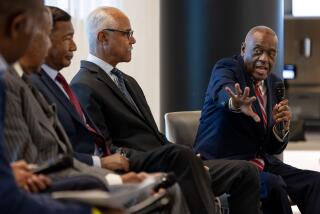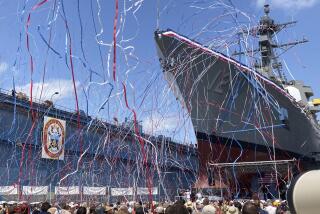Marine History Pays a Visit in Dress Blues
- Share via
Every U.S. Marine has heard of the World War I Battle of Belleau Wood and of one of its most famous warriors, John Groff. On Friday, history turned into flesh and blood as Groff, celebrating his 100th birthday, reviewed the graduation of a new generation of Marine recruits, who one day may themselves be called to fight another War to End All Wars.
Groff, the oldest living former Marine Corps general, wore his dress blues adorned with the Navy Cross, the Distinguished Service Cross and the Purple Heart, as well as campaign medals from the two World Wars, at the ceremony at the Marine Corps Recruit Depot.
Although Groff had been one of the Marines who were sent to Veracruz in 1914 and to Haiti in 1915, it was at the later battle in the French woods that he learned the meaning of the words danger and scared , he said.
“We had a skirmish line, and, before we knew it, we had lost half of our men--wounded and killed because of machine-gun fire. . . . Men were bleeding to death and begging that something be done for them, and we couldn’t do it,” Groff recounted Friday. “We had to go forward or we would have been wounded.”
Groff, then a gunnery sergeant, was wounded as he led a platoon down a ravine and behind German soldiers, whom they captured.
In the June, 1918, battle, American forces--including two Marine divisions--advanced on a large contingent of German soldiers entrenched in the French woods near the village of Bouresches in northern France.
In the bloody fight that ensued, the Marines earned their reputation as tenacious fighters, as well as the German nickname of “Devil Dogs,” as they pressed relentlessly toward German machine-gun emplacements.
More than 5,000 Americans died; the Marines lost about half their men during the two weeks of combat.
During the battle, Groff earned the Navy Cross and the Distinguished Service Cross. He later became the recipient of a Purple Heart. After the war, he stayed in Germany, returning to the Marine barracks in Quantico, Va., in 1919. He was assigned as a commanding officer of the peace-keeping forces in Haiti from 1921 to 1923.
Groff’s career parallels much Marine history, including military forays into Nicaragua in 1927 and Haiti in 1928. But perhaps his most important mission was as commanding officer of the Marine Corps Depot in San Diego, where he oversaw training of Marines from 1938 through much of World War II.
In 1942, he was part of the contingent that officially dedicated a new Marine Corps base, a large piece of wind-swept land known as Camp Pendleton. Also there that Sept. 25 was President Franklin D. Roosevelt.
Later Groff was transferred to Camp Elliott on Kearny Mesa--no longer in existence--and was promoted to colonel. He then became chief of staff of the Marine Corps Recruit Depot.
After 33 years as a Marine, Groff retired in 1946 and was promoted to brigadier general.
After Friday’s graduation ceremony, Groff enjoyed lunch in the officers’ mess hall. Joining him were other military heroes from yesteryear: Major Gen. John Farrell, 94, and Lt. Gen. Edward W. Snedeker, 87--as well as Groff’s son John and his grandchildren and great-grandchildren. The youngest of those--98 years younger than her great-granddad--was Stacey, 2, who wore a green velvet dress and a gold ribbon in her hair.
Major Gen. John S. Grinalds, the depot’s commanding officer, read letters from President Bush and A. M. Gray, the Marine Corps commandant.
Groff belied his age Friday. He was energetic, animated and brimming with humor in conversation. He ordered his lunch guests to “ATTEN-TION!” as he cut his own cake. He lives in Oceanside, and walks the beach regularly for exercise, he says, although he uses a cane.
Wide-eyed Marine captains and gunnery sergeants, among others, looked on. To them, the old general was a living link to Marine Corps history.
Said Gunnery Sgt. Larry Crutchfield: “The weapons may change, but men remain the same.”
More to Read
Sign up for Essential California
The most important California stories and recommendations in your inbox every morning.
You may occasionally receive promotional content from the Los Angeles Times.













